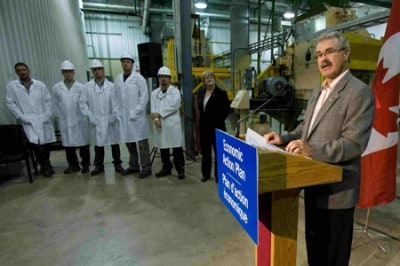Is Bioexx a Takeover Candidate, or can it Rebound in 2012?

Shuffling management, delays in bringing its Saskatchewan oilseed extraction plant up to speed and continued losses (the company’s Q3 loss of $5.75 million was typical of recent quarters) meant a devastating year for the company’s share price, which began the year at $2.19 and closed at $.16 cents.
The language of the company’s most recent MD&A, which said “challenges of a full plant start-up with ground-breaking technology have proven to be a significant – difficult both to estimate in advance and to work through in practice.” means that management has acknowledged the problem. Fixing these problems, however, is a challenge that will define Bioexx in this new year.
And while Bioexx management, led by CEO Chris Schnarr, who had his interim status removed in November, says it believes the $18.34 million it has on hand is enough to execute on its business plan, it must also knows that another year like 2011 would put its future in serious jeopardy. The $23 million the company raised in 2011, at the now seemingly lofty price of $1, would obviously be nowhere near as dilutive as a financing today would be.
________________________
This story is brought to you by Cantech Letter sponsor BIOX (TSX:BX). The largest producer of biodiesel in Canada, BIOX’s proprietary production process has the capability to use a variety of feedstock, including recycled vegetable oils, agricultural seed oils, yellow greases and tallow. For more information CLICK HERE.
_______________________
All this meant that Bioexx’s final news release of 2011 was probably less than surprising to many that follow the company closely. On December 20th, the company announced it hired Canaccord Genuity to find a partner who can “that can leverage the company’s intellectual property and extensive operating knowledge of food-grade canola protein.”
But Raymond James analyst Steve Hansen believes Bioexx’s depressed share price is actually just as likely to attract a takeover bid.
While the internal problems of the company may have overshadowed the opportunity, Bioexx management says that while things haven’t unfolded as smoothly as expected, CEO Chris Schnarr says the failures of 2011 shouldn’t completely overshadow the company’s assets, which he believes remain intact.
“We are therefore now looking to leverage the growing value of our intellectual property and extensive operating knowledge” said Schnarr in a recent press release “…by pairing these two drivers with the things we lack — long-term growth capital and global commercial infrastructure — so that we can maximize value for our shareholders.”
One small silver lining lies in the fact that in the time the company has struggled bringing its plant to commercialization, interest in plant based proteins has risen. Food shortages, such as the recent one in Venezuela, were front page news throughout 2011.
Oilseed extraction has it attracted worldwide attention because of the increasing scarcity of protein sources. Some experts believe that as the world population grows traditional sources of protein, such as those derived from animals, will become expensive and unsustainable. They surmise that protein from seeds such as canola will naturally follow the lead of the most recognizable oilseed product; soy. According to the USDA, worldwide soy consumption rose 125 percent from 1990 to 2007.
Until recently, the technology for extracting the protein from a plant wasn’t practical because the process required temperatures in excess of 100°C. When proteins are exposed to temperatures above 65°C they begin to denature, which reduces their nutritive value. Bioexx believes its patented extraction system, which uses refrigerant-based solvents “is the only known commercial system that allows for low temperatures to be maintained during the extraction of oils and proteins from the biomass”.
______________________
_______________________
Nick Waddell
Founder of Cantech Letter
Cantech Letter founder and editor Nick Waddell has lived in five Canadian provinces and is proud of his country's often overlooked contributions to the world of science and technology. Waddell takes a regular shift on the Canadian media circuit, making appearances on CTV, CBC and BNN, and contributing to publications such as Canadian Business and Business Insider.


